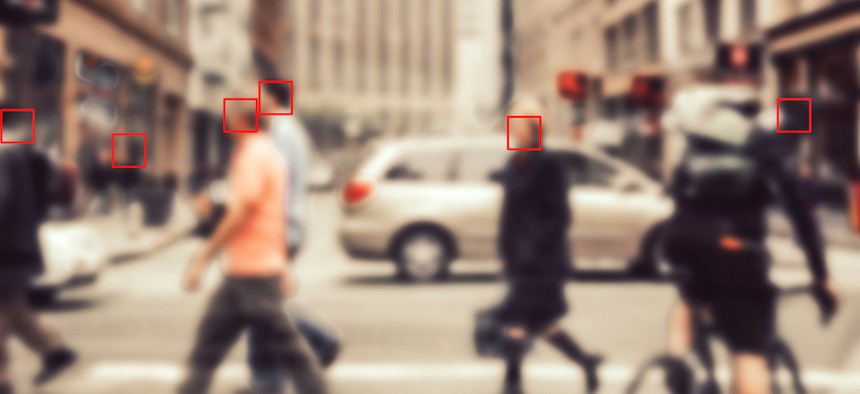New York City to weigh strict facial recognition ban

vasare/Getty Images
Legislation would bar the use of the technology in public places and in residential buildings and would be one of the strictest prohibitions in the United States.
New York City will soon consider one of the strictest city-level bans on facial recognition technology under two bills recently introduced by city council members.
The proposed legislation would ban the use of facial recognition in public places and in residential buildings without customers’ or tenants’ explicit consent. Both bills prohibit technology that collects biometric identifiers, like an individual’s retina or iris, finger, voice, palm print, movement patterns or any other characteristic “that can be used alone or in combination with each other, or with other information, to establish individual identity.”
The former bill bans the use of that technology in commercial establishments, which it defines as places of entertainment, retail stores or businesses that sell food and drink. Financial institutions are specifically exempted from the bill. Any company that chooses to collect that biometric information would have to notify customers and obtain their written consent. The business would also be banned from storing that information themselves or sharing it with third parties.
Any business that intentionally violates the law would face a $5,000 fine per violation and would have to cover legal fees. Since 2021, the city’s administrative code has required businesses to post signs by their entrances if they are collecting customers’ biometric information and allow members of the public a right of action against violators. This bill would strengthen and codify those requirements in law.
The latter bill would prevent landlords or owners of residential buildings from installing, activating or using “any biometric recognition technology that identifies tenants or the guest of a tenant.”
The proposed legislation comes on the heels of revelations late last year that MSG Entertainment, which owns Madison Square Garden, Radio City Music Hall and other venues in the city, used facial recognition technology to bar individuals the company deemed its enemies from entering, including attorneys involved in litigation against owner James Dolan. In response, the New York State Liquor Authority started proceedings last month to strip the venues of their liquor licenses.
Various groups have long campaigned for the city to ban the use of facial recognition technology, with Amnesty International among those saying it “threatens fundamental rights” including the right to protest, and it places ethnic minorities at risk of being falsely identified by the technology and arrested.
Digital rights advocacy group Fight for the Future has also been among those pushing for a citywide ban. In an email, Campaigner Leila Nashashibi said the technology “poses such a threat to the future of liberty that it cannot be effectively regulated” and so “must be banned.”
“In the hands of rich people like James Dolan, facial recognition can also be abused for profit and power,” she continued. “By introducing legislation that bans facial recognition in places of public accommodation, New York City is fighting back against these abuses, and ensuring that everyday people are protected from the surveillance technology that threatens to strip away our privacy and our rights.”
The U.S. city with a ban most comparable to this one is Portland, Oregon, which prohibits the use of facial recognition technology by city agencies and by private businesses that operate in public spaces. In 2019, San Francisco banned use of the technology by law enforcement and other agencies, while Massachusetts implemented statewide restrictions on its use by police in 2021.
The bills are reportedly scheduled to be introduced at a New York City Council meeting on April 27 and will be debated by its Committee on Technology two days prior.
NEXT STORY: Smart cameras ID bus lane violators






